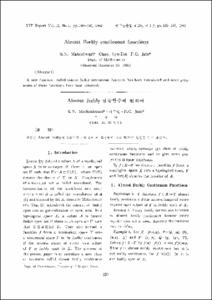기업지배구조의 국제적 추세 및 글로벌스탠다드
- Alternative Title
- International Trends and Global Standard of Corporate Governance
- Abstract
- 본 연구에서는 한국 기업지배구조 개선의 핵심이라고 할 수 있는 이사회의 구성과 책임을 중심으로 이론적인 심층연구를 바탕으로 지배대주주 및 경영진으로부터 독립적이면서 전체 주주의 이익을 대변해 줄 수 있는 가치창출형 이사회 제도의 확립을 위해 어떤 점을 주의해야 할 것인가를 제시해 보고자 하였다. 전체적으로 볼 때 사외이사의 긍정적인 역할은 책임성의 제고 즉, 경영자 감시역할에 있고, 기업의 사업활동에는 제약적인 역할을 하며, 기업성과와는 별 관계가 없는 것으로 요약될 수 있다. 그리고 규모가 큰 이사회는 기업의 성과를 좋지 않게 만드는 요인으로 볼 수 있으며, 이사에 대한 보수 및 인센티브 제도로 자주 활용되고 있는 성과관련 보수제도가 기업의 사업활동 수행에 있어서 이사들의 위험한 행동을 유발할 수 있다는 점에 유의해야 한다. 또한 이사의 지분 소유는 기업성과에 대체로 긍정적 영향을 미치지만 참호효과가 나타날 수 있음을 주의해야 한다.
The purpose of this study is to suggest some critical points in establishing a value creating system of board of directors which is independent from management and ruling majority stock owners. The review in this study was focused on the structure of board of directors and directors 'remuneration and ownership, which are the most important issues for the improvement of Korean corporate governance. The results of literature review could be summarized as follows; the positive role of outside directors could be seen in the accountability enhancement by monitoring management, but their role was negatively related to business activities and had no specific relationship with the corporate performance. And the size of board could have negative relationship with performance. The performance related remuneration system, which is adopted by many firms as a incentives for directors, can also be a causing factor for a risky decision in their activities. Directors 'ownership has generally positive effects on performance, but it could have an entrenchment effect at the same time.
The purpose of this study is to suggest some critical points in establishing a value creating system of board of directors which is independent from management and ruling majority stock owners. The review in this study was focused on the structure of board of directors and directors 'remuneration and ownership, which are the most important issues for the improvement of Korean corporate governance. The results of literature review could be summarized as follows; the positive role of outside directors could be seen in the accountability enhancement by monitoring management, but their role was negatively related to business activities and had no specific relationship with the corporate performance. And the size of board could have negative relationship with performance. The performance related remuneration system, which is adopted by many firms as a incentives for directors, can also be a causing factor for a risky decision in their activities. Directors 'ownership has generally positive effects on performance, but it could have an entrenchment effect at the same time.
- Issued Date
- 2000
- Type
- Research Laboratory
- Alternative Author(s)
- Heo, Yeong-Do
- Publisher
- 경영학연구논문집
- Language
- kor
- Rights
- 울산대학교 저작물은 저작권에 의해 보호받습니다.
- Citation Volume
- 7
- Citation Number
- 2
- Citation Start Page
- 45
- Citation End Page
- 65
- Appears in Collections:
- Research Laboratory > Journal of management
- 파일 목록
-
-
Download
 000002025150.pdf
기타 데이터 / 139.91 kB / Adobe PDF
000002025150.pdf
기타 데이터 / 139.91 kB / Adobe PDF
-
Items in Repository are protected by copyright, with all rights reserved, unless otherwise indicated.